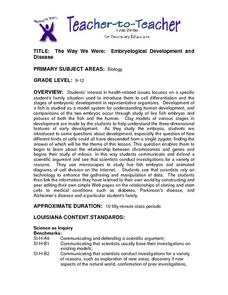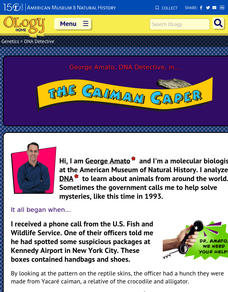Curated OER
The Way We Were: Embryological Development and Disease
Students use microscopes to study live fish embryos and animated diagrams of cell division on the Internet. They see that scientists rely on technology to enhance the gathering and manipulation of data. They create web pages on cloning.
Museum of Science
Strawberry DNA
Humans aren't the only ones with DNA—fruit has it too. Using a extraction solution, pupils pull the DNA out of a piece of fruit. Learners crush up a piece of fruit with the solution and filter out the solids. Scholars then add cold...
American Museum of Natural History
DNA Detective
Match up the DNA code. Pupils read the website from the American Museum of Natural History about how DNA can determine whether a skin is from a particular type of reptile. Using the same technique, learners match up products with the...
American Museum of Natural History
What's the Big Idea About Genetics?
Here's a quick read on genetics. An engaging online resource provides six slides of information about genetics. Learners read about the meaning of genetics to information about DNA. They also learn about the study of genes and the...
American Museum of Natural History
What Do You Know About Genetics?
Just what do you know about genetics? The online resource contains 10 questions about genetics. Scholars work through the questions ranging from what DNA stands for to how much of human DNA is similar to that of a fruit fly. Scholars...
Biology Junction
Nucleic Acids
Genetic information transfers through nucleic acids, making these the chemical link that connects people to their parents and grandparents. Viewers determine the importance of both DNA and RNA after observing the presentation. Key...
Chemistry Collective
Virtual Lab: DNA Binding Problem
Why do the bases in DNA pair up the way they do? Unravel the mystery of the double helix in a virtual lab. Young scientists follow in the footsteps of Watson and Crick to determine the free energy associated with DNA base pair binding....
Biology Corner
DNA The Blueprint of Life
Engage learners with an intriguing presentation on DNA and its role in organisms. Individuals see its structure, what genes are, how the code works, and then explore DNA replication. For advanced classes, the presentation introduces...
National Institute of Open Schooling
Biomolecules
An informative lesson has learners read about, discuss, and study the classification, structure and importance of the following biomolecules: carbohydrates, proteins, lipids, nucleic acids, and enzymes.
Teach Engineering
Imagining DNA Structure
Let's get a closer look at DNA and other molecular structures. The first instructional activity in the series of four introduces a variety of imagining techniques that engineers and scientists use to visualize molecular structures. The...
Teach Engineering
Inside the DNA
Get your class to take a closer look at DNA. Pupils conduct research to determine the methods used by scientists to analyze the molecular structure of DNA. The class members investigate different types of molecular imaging along with gel...
Virginia Department of Education
Building a DNA Model
It has been decades since the discovery of DNA. Still, activities such building this DNA model allow blossoming scientists to better understand the components that form this overall structure. During this activity, they will also...
Gallantsbiocorner.com
The Cell
Help young biologists piece together an understanding of cell structure with a comprehensive review worksheet. Tasking students with describing the function of the organelles found in cells and their relationship with one another, this...
Curated OER
DNA: Expressions in Agriculture
What is DNA extraction, and can you make a living doing it? Yes, if you are in a biotechnology field. Kids learn about DNA extraction, GMOs, and biotechnology careers. They then watch videos and complete activities to understand the use...
Curated OER
Final Exam Practice - General Biology
A 17-page practice final exam for a college-level introductory biology course is contained in this resource. Matching and short answer questions cover every topic that you would expect to teach during an advanced biology course including...
Curated OER
What is Biotechnology?
Young consumers explore the concept of biotechnology as it pertains to the foods they eat, economics, and agriculture. They watch several videos, explore a website, complete worksheets, and engage in class discussion. Son they'll know...
Curated OER
Extract DNA from a Banana
Your scientists-in-training extract DNA from a banana. Then, they wrap it around a glass rod in order to view the threads of DNA. They draw their observations.
Curated OER
7.012 Fall 2004 Section Self-quiz
This quiz just looks neat! It has two cell diagrams for biology class members to label. They also describe the function of each organelle. A prokaryotic and eukaryotic cell are displayed for them to compare, and then they fill in the...
Curated OER
Protein Synthesis Worksheet
Future geneticists use base pairing rules to build DNA and RNA polypeptide strands, and then explain both transcription and translation. Although the chains themselves are a little blurry, there is plenty of room in them for learners to...
Curated OER
The Clark Family Story: Tracing the Cause of Hemophilia
Ms. Strohfeldt did not omit anything when she designed this comprehensive lesson plan on DNA mutation and sex-linked traits. Begin with a pretest as an anticipatory set. Read a case history of the Clark family and the occurrence of...
Curated OER
From Gene to Protein ~ Transcription and Translation
Translate the process of protein synthesis to your molecular biologists with this instructional activity. It consists of reading, completing a table as a summary, comprehension questions, and a modeling activity for both transcription...
Serendip
Genetics
A handout on genetic inheritance begins with a reading on alleles and how they can result in albinism. Junior geneticists learn to complete Punnett squares and participate in a coin toss simulation of allele pairing. They also learn...
Curated OER
Extracting DNA from Your Cells
Three steps are needed to extract DNA from learners' inner cheek cells. The procedure and reasons for each step are explained. As enzymes work on the cells, a series of questions are answered regarding the structure of the DNA molecule....
Curated OER
DNA Extraction from Yeast Cells
Students explore DNA. They work in groups and mix prepared detergent/ salt solution, meat tenderizer solution, Fleischman's yeast and water to extract DNA from yeast. Observations are recorded.

























